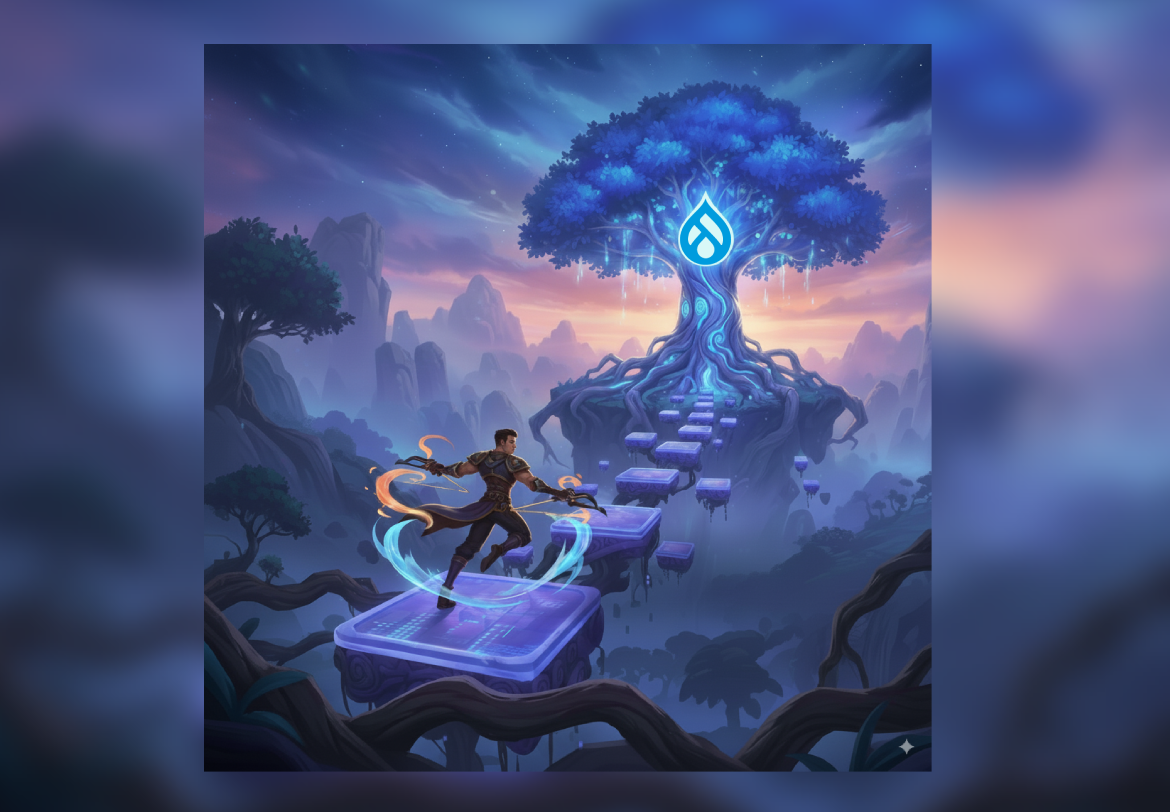Ibo was vibing in his usual setup—RGB lights on, iced coffee in hand, lo-fi beats on Spotify. His TikTok algorithm was serving him a mix of side hustle hacks, AI tools, and creators flexing their personal websites like they were the new designer drip. He had just launched his sneaker side hustle (custom kicks that went hard), but his site? Total NPC vibes. Every site builder he tried gave him the same “choose a template and don’t touch anything” energy. His site looked like every other Shopify clone out there. Mid.
Then, in a Discord server, someone dropped a message that changed everything:
“Bo, quit playing with those baby site builders. If you want a site that can go god-tier, learn Drupal.”
Ibo squinted at his screen. Drupal? That sounded like a Pokémon evolution or a hero in Mobile Legends. He googled it, half-expecting to find a dusty 2001 relic. Instead, he found an open-source ecosystem with modules, themes, and a whole fandom of devs hyping it up like it was endgame content.
Drupal IRL
For beginners, Drupal feels like logging into a new MMO. The map is huge, the menus are everywhere, and you’ve got no idea which questline to start. But once you learn the ropes, you realize it’s not just another website builder—it’s a content management system (CMS).
Here’s the vibe:
- • WordPress is like renting an apartment—you can decorate, but you’re stuck with the walls.
- • Wix or Squarespace? That’s basically living in IKEA. Cute, but same as everyone else.
- • Drupal? That’s like ML Creation Camp on max level—you can craft your own hero skins, build epic arenas, or design a full battlefield if you want.
Basically, Drupal = freedom with extra grind.
First Time Booting Up
Installing Drupal felt like queuing up for your very first ranked match in ML and realizing you accidentally picked a hero you’ve never tried before. The interface wasn’t all smooth and shiny—it was ability trees inside item builds inside hero stats. Words like “Taxonomy,” “Nodes,” and “Views” popped up on screen, and Ibo swore they sounded less like website tools and more like the ultimate skills from some overpowered marksman hero (Wanwan, anyone?).
Ibo had YouTube open on one tab, Reddit on another, and still felt like rage-quitting. But here’s the twist: that difficulty is why people who master Drupal are basically OP.
The first time Ibo created a custom content type—sneakers with size, color, and style fields—he felt like he’d just unlocked a hidden skin. His site wasn’t cookie-cutter anymore. It was fully dripped out, one-of-one.
Modules = DLC Superpowers
Modules are Drupal’s secret sauce. They’re like DLC packs for your site.
- • Want SEO buffs? Module.
- • Want TikTok/Instagram/Moontoon login? Module.
- • Need full e-commerce with payments? Module.
- • Wanna let users design their own sneakers on the site? Boom—there’s a module for that too.
Ibo went wild. After installing a design-your-own-sneaker module, his site transformed from basic Shopify clone to interactive sneakerverse. His customers could literally customize shoes online like they were modding a character in-game.
The Community Energy
Unlike soulless corporate platforms that juices out money from you, Drupal is open-source. That means devs worldwide contribute just because they want to. The community is basically a massive co-op guild.
On forums and Discord servers, Ibo found people who didn’t just ghost him when he asked noob questions. They actually helped. They dropped free themes, code snippets, and tips. It wasn’t “pay 5k for support,” it was “pull up, we gotchu.”
In an era where everything’s subscription-gated, that open-source energy hit differently - Drupal is a based tool.
The Grind (and the Wins)
Learning Drupal wasn’t a chill stroll—it was more like grinding for Mythical Immortal rank. Lots of rage, plenty of trial and error, but every W felt worth it.
- • Customizing his theme with brand colors? That was like unlocking a Collector skin—dripped out and unique.
- • Adding sneaker reviews and user profiles? Instant squad vibes, like building a full team comp.
- • Landing his very first sale through the site? Pure dopamine, the kind you only get after a clutch win.
That’s when Ibo realized Drupal wasn’t just software—it was a cheat code for independence. Straight lit.
Real talk: if all you want is a quick, cute “link in bio,” Wix is fine—no cap. But if you’re trying to go Mythic-tier, actually own your platform, grind it like a pro, and not get yeeted off TikTok or Instagram by some random algorithm? Drupal is the OP pick.
These days, everyone’s scared of getting de-platformed, demonetized, or straight-up deleted by some algorithm ulti. Owning your own digital turf is clutch. Drupal gives you that freedom—no landlord vibes, just you carrying your website like a true hero.
In 2025, control = currency, and Drupal? It literally hands you the legendary lucky box keys.
Ibo’s Level-Up
Fast forward a few months, Ibo’s sneaker site wasn’t just a shop. It was THE market. People were customizing kicks, leaving reviews, flexing their fits on forums. He even started a YouTube channel teaching others how to use Drupal—turning his late-night rage quits into funny tutorials.
Drupal gave him more than a website. It gave him a brand, a community, and skills he could monetize forever.
So what is Drupal? Officially, it’s a CMS. But for Ibo—and maybe for you—it’s more like a starter kit for digital freedom.
Because in a world where the algorithm decides who's giving, owning your own platform is the ultimate glow-up.

